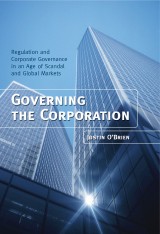Details

Governing the Corporation
Regulation and Corporate Governance in an Age of Scandal and Global Markets1. Aufl.
|
61,99 € |
|
| Verlag: | Wiley |
| Format: | |
| Veröffentl.: | 01.11.2005 |
| ISBN/EAN: | 9780470017531 |
| Sprache: | englisch |
| Anzahl Seiten: | 406 |
DRM-geschütztes eBook, Sie benötigen z.B. Adobe Digital Editions und eine Adobe ID zum Lesen.
Beschreibungen
<i>Governing the Corporation</i> is a unique forum combining the insights of some of the most influential minds involved in the governance of global financial markets with internationally recognised academics and practitioners. <p>Divided into three sections, the book first examines changes to the regulation of markets and assesses the global implications of the export of Sarbanes-Oxley for financial sector governance. The second section examines the challenges facing the professions with critical analysis from leading lawyers and accountants. The final section calculates the effectiveness of state and self-regulatory policy and posits the importance of institutionalising an ethical framework tied to incentives. Each section of the book features contributions from regulators, practitioners and academics from a range of disciplines, including finance, political science, criminology, law and philosophy. </p>
List of Contributors. <p>Acknowledgements.</p> <p>1. Governing the Corporation: Corporate Governance and Regulation in Global Markets (Justin O’Brien).</p> <p>2. Restoring Trust after Recent Accountability Failures (David M. Walker).</p> <p>3. Accountability in the Age of Global Markets (William J. McDonough).</p> <p>4. European Responses to Corporate Governance Challenges (Alexander A. Schaub).</p> <p>5. Economic Globalisation and National Corporate Governance Reform (Dermont McCann).</p> <p>6. From Workers to Global Politics: How The Way We Work Provide Answers to Corporate Governance Questions (Irene Lynch-Fannon).</p> <p>7. Multi-Lateral Regulatory Initiatives—A Legitimation-based Approach (George Gilligan).</p> <p>8. Corporate Social Responsibility as Regulation: The Argument from Democracy (Lisa Whitehouse).</p> <p>9. The Criminological Lens: Understanding Criminal Law and Corporate Governance (Laureen Snider).</p> <p>10. Detecting Fraud and Managing the Risk (Nicholas M. Hodson).</p> <p>11. After Enron: Corporate Governance, Creative Compliance and the Uses of Corporate Social Responsibility (Doreen McBarnet).</p> <p>12. The Role of Lawyers: Hired Guns or Public Servant (Jeremy P. Carver)?</p> <p>13. Financial Reporting, Corporate Governance and Parmalat: Was it a Financial Reporting Failure (Giovanni Melis and Andrea Melis)?</p> <p>14. Corporate Regulation in Ireland (Paul Appleby).</p> <p>15. Corporate Governance – More Than a State of Mind (Neill Buck)?</p> <p>16. Redesigning Financial Regulation: Eliot Spitzer, State-Federal Relations and the Battle for Corporate Control (Justin O’Brien).</p> <p>17. Public Trusteeship: The Responsibilities of Transparency and Legacy (J. Patrick Dobel).</p> <p>Bibliography.</p> <p>Index.</p>
Dr Justin O'Brien runs the Corporate Governance Programme at the School of Law, Queen's University, Belfast. He is the author of <i>Wall Street on Trial</i>, also published by John Wiley & Sons. He is currently working on a major international research project examining regulatory regime change in global financial markets, funded by the Economic and Social Research Council.
The demise of the era of the imperial chief executive has been accompanied by a resurgence in financial regulation. High-level criminal prosecutions, proactive enforcement strategies and a strengthened resolve to police deficiencies have made compliance an imperative. Have the reforms introduced in the United States done enough to address what President Bush has termed 'America's greatest need: higher ethical standards - standards enforced by strict laws and upheld by responsible business leaders'? Given the global importance of US capital markets, what are the global implications of the triangulated American legislative, legal and regulatory response. <p>How to govern the corporation and the markets in which they operate have become public and corporate priorities with a salience emanating far beyond the narrow confines of the business community. Following three years of scandal, the initial quiescence by business has dissipated. The target is the Public Company Accounting Reform and Investor Protection Act, or Sarbanes-Oxley, the centre-piece of the reform agenda. An excessive intervention in the private governance of the corporation or a necessary policing mechanism?</p> <p>This collection brings together leading practitioners, regulators and academics to debate the causes and consequences of corporate governance reform and financial regulation in an Age of Scandal. It provides</p> <ul> <li>Cutting edge debate on the effectiveness of Sarbanes-Oxley from those involved in its implementation, including leading US and EU regulators;</li> <li>Expert analysis on the causes and consequences of corporate failure;</li> <li>Practical advice on how to inculcate values into value within a corporate context;</li> <li>An appreciation of the political determinants of regulatory design.</li> </ul>


















